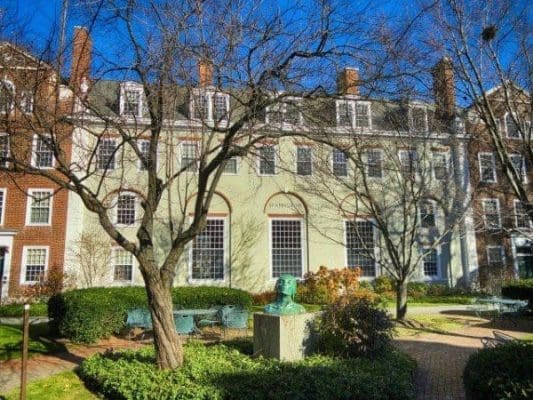Harvard University must face litigation from families whose loved ones’ donated remains were allegedly stolen and sold on the black market by the former manager of its medical school morgue, the Massachusetts Supreme Judicial Court ruled Monday.
The court determined that Harvard failed to adequately supervise Cedric Lodge, who admitted to stealing skin, brains, and bones from bodies donated to the medical school for educational purposes. The ruling reverses a lower court decision that had dismissed the families’ lawsuits against the prestigious institution.
Lodge, who managed the Harvard Medical School morgue, removed organs, brains, skin, hands, faces, dissected heads, and other parts from donated cadavers after they had been used for research and teaching but before proper disposal. He then allegedly sold these remains through what prosecutors described as a nationwide trafficking network.
Lodge, 57, was arrested two years ago on charges involving heads, brains, skin, and bones taken from donated cadavers and sold as part of a nationwide network of people buying and selling human remains. In May 2025, he pleaded guilty to trafficking stolen human body parts.
The Supreme Judicial Court’s decision allows families to pursue negligence claims against Harvard and the director of its Anatomical Gift Program, arguing the university bore responsibility for supervising Lodge during his 27 year tenure managing the morgue. The court found sufficient evidence that Harvard may have breached its duty of care to families who entrusted their loved ones’ bodies for medical education.
However, the court did not revive claims against another employee of Harvard’s Anatomical Gift Program. The ruling focuses specifically on institutional oversight failures rather than individual employee liability beyond Lodge himself.
The decision represents a significant legal development for families who donated their relatives’ remains expecting them to contribute to medical research and training, only to discover they had been desecrated and commodified. The emotional toll on affected families extends beyond the violation of their loved ones’ bodies to the betrayal of trust they placed in one of the world’s most respected medical institutions.
The case has exposed what some observers describe as a gray market in human body parts, where donated remains intended for legitimate medical purposes sometimes enter commercial channels through theft or unauthorized sales. The trafficking network allegedly connected Lodge to buyers across multiple states who purchased body parts for purposes ranging from macabre collections to commercial uses.
Lodge allegedly allowed people to choose body parts they wanted to buy at the morgue before stealing portions of donated cadavers. The brazenness of the scheme, operating within Harvard Medical School itself, raised questions about institutional controls and monitoring systems designed to prevent such abuses.
Harvard Medical School fired Lodge on May 6, 2023, ending his 27 years as morgue manager. The university’s employment of Lodge for nearly three decades without detecting the trafficking operation became a central element in families’ arguments that Harvard failed in its supervisory responsibilities.
The criminal case against Lodge resulted in his guilty plea to interstate transport of stolen human remains, charges that carry potential prison sentences up to ten years. His legal team argued during proceedings that body parts themselves lack legal status as property under certain interpretations, though prosecutors successfully pursued trafficking charges based on unauthorized removal and commercial sale.
Beyond Lodge, several other individuals faced charges connected to the trafficking network. The scope of the operation suggested systematic procurement and distribution channels rather than isolated incidents, with remains allegedly moving between states and changing hands multiple times.
For Harvard, the Supreme Judicial Court ruling means defending against negligence claims that the university’s oversight failures enabled Lodge’s crimes. The institution faces difficult questions about internal controls, how Lodge operated undetected for years, and whether warning signs were missed or ignored.
The lawsuits seek damages for emotional distress, violation of dignity, and breach of fiduciary duty. Families argue that donating bodies for medical education creates a special relationship requiring heightened care and supervision, standards they claim Harvard failed to meet.
The case also raises broader policy questions about regulation of anatomical gift programs, supervision of morgue operations, and accountability mechanisms when donated bodies are mishandled. While body donation serves critical educational and research purposes, this scandal highlights vulnerabilities in systems relying on institutional integrity and individual ethics.
Medical schools across the country have examined their own protocols following Harvard’s scandal, implementing additional security measures, enhanced supervision, and stricter inventory controls. The incident demonstrated that even elite institutions with prestigious reputations require robust safeguards against employee misconduct involving vulnerable materials like human remains.
For affected families, the Supreme Judicial Court’s ruling provides an opportunity to hold Harvard accountable through civil litigation, though no legal victory can undo the violation of their loved ones’ bodies or fully repair the emotional harm caused by discovering their trust was betrayed.
The case will now return to lower courts for trial proceedings unless Harvard chooses to settle with families. The university faces not only potential financial liability but continued public scrutiny of an episode that has stained its reputation and raised fundamental questions about institutional responsibility for sacred duties like safeguarding donated human remains.
Source: newsghana.com.gh











